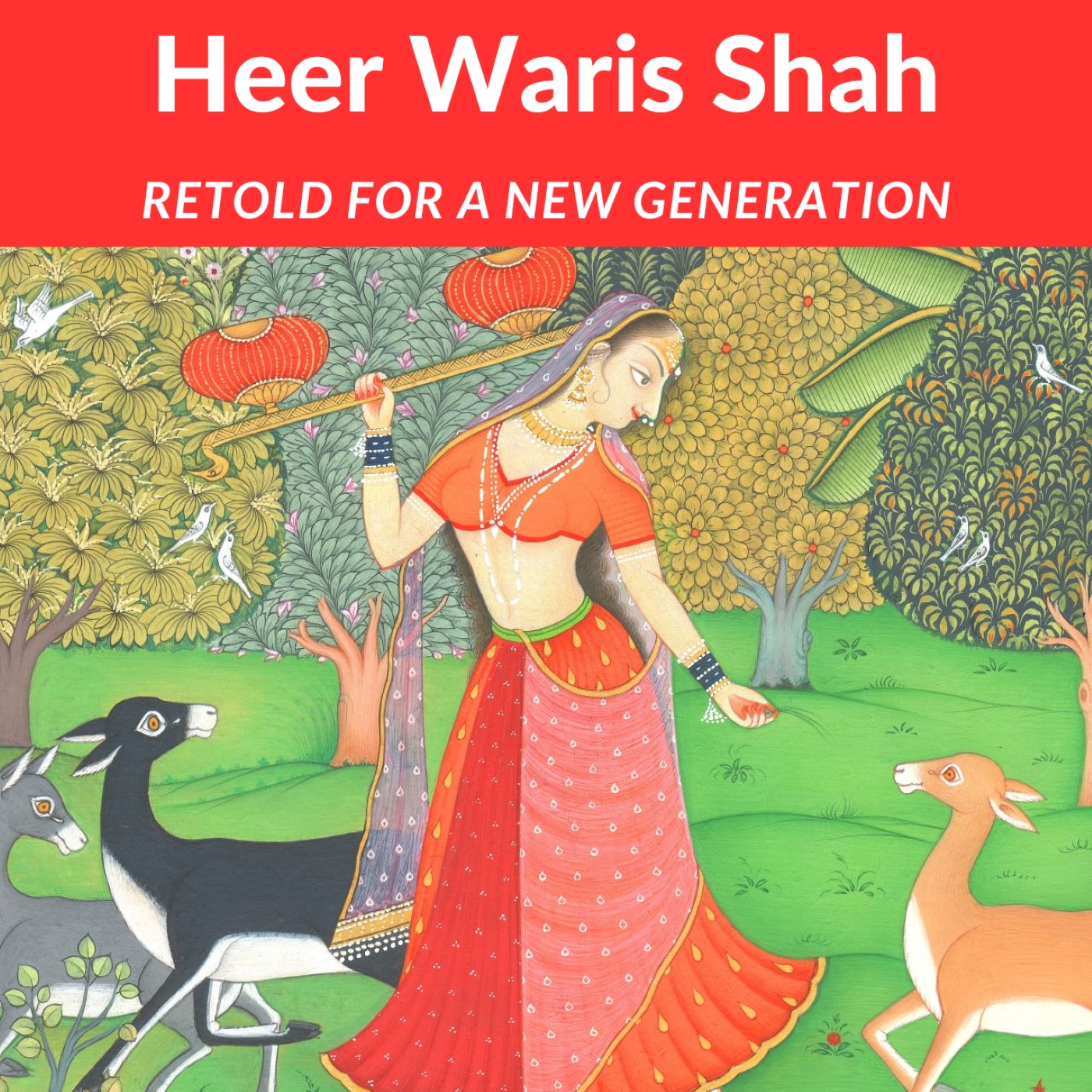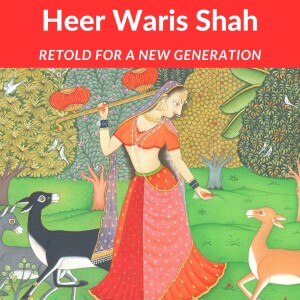
4.3K
Downloads
94
Episodes
Waris Shah’s Heer, a Sufi masterpiece, which tells the tragic tale of Heer and Ranjha; each verse is presented with an English translation, making this epic accessible to a new generation.
Waris Shah’s Heer, a Sufi masterpiece, which tells the tragic tale of Heer and Ranjha; each verse is presented with an English translation, making this epic accessible to a new generation.
Episodes

Monday Sep 02, 2024
Verse 50 - Ranha asks about the luxurious bed
Monday Sep 02, 2024
Monday Sep 02, 2024
The wondrous sight of Heer’s opulent bed prompts Ranjha to ask about its owner. He is told by the attendants of the boat that it belongs to Heer, the daughter of the chief of the Sials, Chuchak Khan. Waris Shah starts to tease his listeners with an early sense of his heroine’s personality, who hasn’t yet made her appearance in his epic poem. She is intriguingly described as the ‘king’ of the Sial Tiranjan, the gathering place of the Sial women. She is further decribed as a fairy queen, wrapped in fragrance, who is served by all the boatmen of the piers and the wharves of the Chenab.

Tuesday Sep 03, 2024
Verse 51 - Ranjha on the boat
Tuesday Sep 03, 2024
Tuesday Sep 03, 2024
Ranjha enters the boat and a multitude of travlers follows, the rich and the poor rubbing shoulders comfortably as the mood on the boat becomes festive, almost wedding like. The travelers are all in Ranjha’s thrall and they ply him with sweets, acting like he were the protégé of the legendary saint Al Khizr. Luddan now feels some remorse at denying him passage earlier, but he still has mixed feelings, for he fears that Ranjha has seduced his wives. He feels that Ranjha’s beautiful music, which can charm birds and beasts has magical qualities and thinks that Ranjha is not unlike the cheats of Thanesar who were known to swindle the innocent as they regaled them with fantastical tales of the legendary town. In this verse, Waris Shah presents Ranjha as a groom like figure, welcoming passers by to the boat, charming them with his melodies. While he is on a quest for the beautiful Heer Sial, goaded by sister-in-law’s taunts, he is also undergoing a spiritual transofmration. While some are accepting of this, seeing him almost as a holy figure, others, like Luddan view him with suspicion. At the end of the verse, Waris Shah cheekily declares that Ranjha is a saint, possibly a powerful one, who will have the uncouth boatman beaten. Waris Shah’s narrative is always laced with cheeky humor, echoing the naqals or farces that were enacted during his time for entertainment.

Wednesday Sep 04, 2024
Verse 52 - The news of Ranjha's arrival spreads
Wednesday Sep 04, 2024
Wednesday Sep 04, 2024
The cowherds, who have witnessed Ranjha’s arrival at the wharf, now hasten to their villages and spread the word. A mysterious singer approaches on the boat whose singing is so beautiful that it seems that petals are falling from his lips. He effortlessly and poignantly sings the sorrows of thousands and he lies on Heer Sial’s bed with both of Luddan’s wives. In this verse Waris Shah reintroduces the seductive image of Ranjha presented earlier in the epic, where both his beauty and the power of his music are emphasized. There is a suggestion that Ranjha, in keeping with that image, gets amorous with Luddan’s wives. The poet concludes with a play on words, which is a foreshadowing of things to come. The coming of Ranjha is described as the arrival of new or virginal calamaties and there is a foreshadowing of the derangement that often accompanies young love. The reference here is to the innocence of Heer and the misery that will descend on her after she falls in love with Ranjha.

Thursday Sep 05, 2024
Verse 53 - Ranjha is quizzed by his fellow passengers
Thursday Sep 05, 2024
Thursday Sep 05, 2024
Ranjha’s fellow travelers on the boat, serving as Waris Shahs’s Greek chorus, subject him to a barrage of questions, not in an unkind manner. In their eyes, Ranjha appears as a handsome lad of noble bearing, who seems to be on an arduous journey. They wonder why he has left home and cannot understand how his family might have let him leave.

Friday Sep 06, 2024
Verse 54 - Of Ranjha and Heer's bed
Friday Sep 06, 2024
Friday Sep 06, 2024
Waris Shah is suggesting here that Ranjha, after having cavorted all night on Heer’s special couch on the boat, feels regret in the morning. In Waris Shah’s epic, the flute playing cowherd, Ranjha often seems to invoke Lord Krishna. There is an implication here that on the beautiful coverlet of Heer’s couch Ranjha indulged in the Rasa, the cosmic dance of Lord Krishna with the Gopis, the milkmaids of the Braj region. Ranjha plays the flute and on the couch, according to the poet, he ‘made the exclusive commonplace’, which imparts a rebellious slant to the protagonist. Self-exiled, landless and poor, he has no social status, yet he aspires to lie on the imperious Heer’s luxurious bed. The cavorting, presumably with Luddan’s wives, reinforces Ranjha’s image of virility, his insousciance and his tendancy towards self indulgence, which is going to change profoundly as he progresses on his spiritual path. Just as Heer is posed to enter the story, Waris Shah, in this verse, emphasizes the personality of his male protagonist at this stage of the tale. Waris Shah’s allusion to the despoiling of Heer’s couch is also telling; it is a foreshadowing of the tragedy that is going to befall his heroine. The reference to Ranjha as ‘Jatt’, in this context, peasant, again emphasizes the social distance that separates Heer and Ranjha and underscores the challenges that lie ahead for the lovers to be.

Saturday Sep 07, 2024
Verse 55 - Heer's stormy entrance
Saturday Sep 07, 2024
Saturday Sep 07, 2024
This is the verse in which Waris Shah introduces his heroine and what an introduction it is! Heer swoops in accompanied by her entourage of sixty maidens. The poet describes her imperious beauty, the fistfuls of pearls that dangle from her ears, clad in bright red, resplendent like a maiden of paradise. Her nose ring shines like the Pole Star and her beauty is marked by tempestousness and the arrogance of youth. She advances in the manner of monarch at the head of a conquering horde and her haughtiness defines her.

Monday Sep 09, 2024
Verse 57 - Heer's dazzling beauty
Monday Sep 09, 2024
Monday Sep 09, 2024
In one of the most evocative verses in poetry that I have ever encountered, Waris Shah paints a dazzling picture of his heroine. Laden with metaphors, the verse decribes not only Heer’s physical beauty, but also her nature and her temperament. Her lips are decribed as rubies and her chin as an apple form exotic lands and then, white unexpectedly her nose is likened to the point of Imam Hussain’s sword! This is telling because Hussain was one of the greatest warriors in the Islamic tradition and the poet is connecting his legendary valor to his heroine. The similies are exquisite and invoke the glory of nature – tresses like fierce balck cobras, pearl white teeth, magnolia leaves. She is as tall as a cypress that proudly stands in paradise and has a graceful crane like neck. Her fingers are slender like the pods of a legume and her arms look as if they heve been rolled with butter. Waris Shah then goes on to describe intimate details of Heer’s anatomy. One might wonder why such an intimate description is necessary in what is a spiritual text! I certainly did when I first encountered it, but then I pondered the descriptions of physical beauty that I have encountered in other spiritual texts, including Gurbani, and came to the conclusion that the poet is essentially paying homage to the beauty of the Divine with his words.
Heer is described as a fairy queen, akin to the legendary beauties of yore like Sita and Panj Phul Rani form the legend of Raja Rup Chander, and the consort of the Hindu god Indra. And then Heer’s personality begins to emerge in a torrent of visual metaphors that seize our attention. When she exuberantly roams around with her band of friends, she evokes a furious host readying for battle, or a herd of deer that joyously burst out of the jungle, prancing and gamboling. She is carefree and haughty, and while she mey be as beautiful as a Russian marionette, she is utterly unattainable. So passionate is her being that the poet likens Heer and her band to a host of Qizilbash, legendary Turkish born warriors who served in the legions of Nadir Shah, rampaging through a town.
And ultimately, Waris Shah says, this young girl, who is the epitome of beauty, grace and valor, from whose being divine melodies emanate, is irresitable. No matter what his hapless hero, Ranjha wagers in the game of love, he is destined to lose.

Tuesday Sep 10, 2024
Verse 58 - Heer chastizes th boatmen
Tuesday Sep 10, 2024
Tuesday Sep 10, 2024
Heer swoops down on the boat and whips the hapless boatmen after having thir hands tied behind their backs, accusing them of offending her by letting a stranger sleep on her bed. The boatmen protest their innocence to no avail.

Tuesday Sep 10, 2024
Verse 56 - In praise of Heer
Tuesday Sep 10, 2024
Tuesday Sep 10, 2024
Waris Shah waxes poetic as he describes the beauty of his heroine. She is as beautiful as the moon and her plaits, capable of slaying, frame her face like moonbeams. Her complexion evokes the color of a shooting star and her intoxicated eyes, the color of the narcissus flower are as beautiful as those of a doe or a wagtail. Her cheeks blossom like a rose and her perfectly arched eyebrows are like legendary bows, fashioned in Lahore. The kohl that adorns her eyes is black and its darkness evokes the feriocity of Sikh warriors who fall upon Mughal lands across the Yamuna. She is the queen of the women’s assemblies, where she struts proudly with the gait of an intoxicated elephant. The moles that adorn her face are the work of a master calligrapher. Such is her imperious beauty that anyone who desires to behold her is fated to suffer and yet the very sight of Heer is a pligramge of great virtue.

Wednesday Sep 11, 2024
Verse 59 - Heer's anger
Wednesday Sep 11, 2024
Wednesday Sep 11, 2024
Heer’s tempestuous personality is emphasized as she rants and raves, calling Ranjha a barbarian and a madman. She declares that as the daughter of Chuchak who rules these lands, she is fearless and declares that she can easily remove him from her couch. She mocks Ranjha by asking rhetorical questions, wondering if he is a mighty king, or perhaps the scion of Nadu Shah of yore, who was known to be pompous and oppressive. She declares that perhaps he thinks he is a fierce lion or a mighty elephant, but he is no match for her.
Finally the poet invokes healers and holy men, placing himself in their company, as he advocates for Ranjha.
